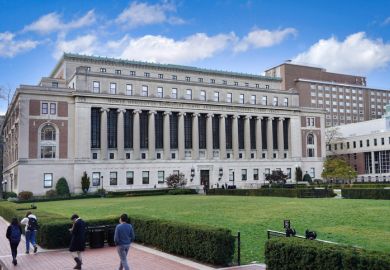Civic leaders speaking at a Conservative Party conference “levelling-up” event have called for further devolution of skills budgets to help universities contribute more to regional economies.
The fringe event at the party’s conference in Manchester on 4 October was chaired by Conservative MP Neil O’Brien, the prime minister’s adviser on levelling-up in the UK regions, and hosted by the Onward thinktank he founded. The event heard a broadly positive account of the economic impact of universities – more positive than that often presented by ministers – including from Sir Richard Leese, the leader of Manchester City Council.
Sir Richard said cities aiming to be globally competitive must have “something to sell the rest of the world wants”, and Manchester’s assets had been its strengths in “research work in advanced materials”, design, biosciences and big data.
Universities’ contribution to city and regional economies came in three elements, Sir Richard said.
“One, they are a big part of the UK economy,” in Manchester worth “several billions of pounds of income, a lot of that is overseas income, lots and lots of jobs, a big economic contributor”, he said.
Then there was “research, particularly translational research; research that’s capable at some point of being converted into products, into jobs”.
And there was their “ability to produce skilled workers”, where he said universities “could be a lot, lot better at than they are”.
The adult education budget was devolved to the Greater Manchester Combined Authority from Westminster in 2019.
Asked if the nation had reached “peak devolution”, Sir Richard said England was “still competing with Scotland and Albania to be the most centralised country in Europe…Just look at the things we haven’t got [devolved]. We talked about adult skills: what about the rest of the skills budget? What about apprenticeships?”
On universities as anchor institutions with a key role in regional economies, Sir Richard said the communities living around Manchester’s hospital complex “used to see the universities as being the enemy. The universities, in turn, wanted to build walls around it…Probably about 15 years ago, the hospitals and universities started talking to people, actively took the barriers down, which has completely transformed the relationships between the universities and those communities – and over time changes the aspirations of those communities.” Positive impact has been achieved “directly through jobs” and local people being able to access jobs at the hospitals and universities, he added.
Laura Shoaf, interim chief executive of the West Midlands Combined Authority, which has also taken responsibility for its adult education budget, stressed the benefits of that devolution. West Midlands mayor Andy Street, a Conservative, said this week that the combined authority had agreed to seek a further devolution deal with the Westminster government that would include the region taking full control over skills funding for 16- to 18-year-olds and for retraining adults.
“It should be areas like us that know best what skills our people need,” said Ms Shoaf. “Being able to have that budget and then being able to target that budget at what we recognise in the West Midlands are specific skills issues, often informed by our universities, is much more powerful than those budgets being allocated from the centre.”
Philip Broadhead, deputy leader of Bournemouth, Christchurch and Poole Council, the largest urban local authority under Conservative control, said that area was “very fortunate” to have three universities.
But he added: “Even in that area, with a plethora of educational opportunities, nobody is really leading from the front on that skills agenda.”
Next month, he said, the council is “creating our own skills commission so we can look at where those gaps are in skills shortages and be a little more interventionist…then let the private sector fill the gaps. There are loads of businesses who want to help, and nobody is giving them any direction.”
Mr Broadhead also said that another positive was the fact that universities “have an awful lot of money…They are on an upward trajectory, still, even through Covid. So spreading some of that wealth around…I think there’s a lot more we can do to work with them and engage with them.”
Register to continue
Why register?
- Registration is free and only takes a moment
- Once registered, you can read 3 articles a month
- Sign up for our newsletter
Subscribe
Or subscribe for unlimited access to:
- Unlimited access to news, views, insights & reviews
- Digital editions
- Digital access to THE’s university and college rankings analysis
Already registered or a current subscriber? Login








